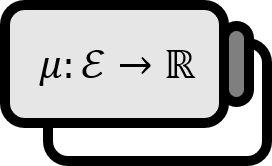Mutually Singular
Definition1
Given two signed measures $\nu$, $\nu$. If there exists a $E,F\ \in \mathcal{E}$ that satisfies the following three conditions for $\nu$, $\mu$, we say that the two signed measures $\nu$, $\mu$ are and denote it as $\nu \perp \mu$ or $\mu \perp \nu$:
- $E \cup F=X$
- $E \cap F=\varnothing$
- $E$ is a null set with respect to $\nu$, and $F$ is a null set with respect to $\mu$.
Also, the expressions ‘$\nu$ is singular with respect to $\mu$’ and ‘$\mu$ is singular with respect to $\nu$’ all mean the same thing.
Explanation
Let $\mu_{n}$ be the Lebesgue measure in $\mathbb{R}^n$. And let $\delta_{x_{0}}$ be defined as the Dirac measure as follows:
$$ \delta_{x_{0}} (E) := \begin{cases} 1 & x_{0} \in E \\ 0 & x_{0} \notin E \end{cases} $$
Suppose $E=\left\{ x_{0} \right\}$, $F=\mathbb{R}^n-E$. Then $E\cup F=\mathbb{R}^n$ and $E \cap F=\varnothing$. Furthermore, $F$ is $\delta_{x_{0}}-\mathrm{null}$ and $E$ is $\mu_{n} -\mathrm{null}$, so the Lebesgue measure and the Dirac measure are mutually singular.
$$ \delta_{x_{0}} \perp \mu_{n} $$
Gerald B. Folland, Real Analysis: Modern Techniques and Their Applications (2nd Edition, 1999), p87 ↩︎
